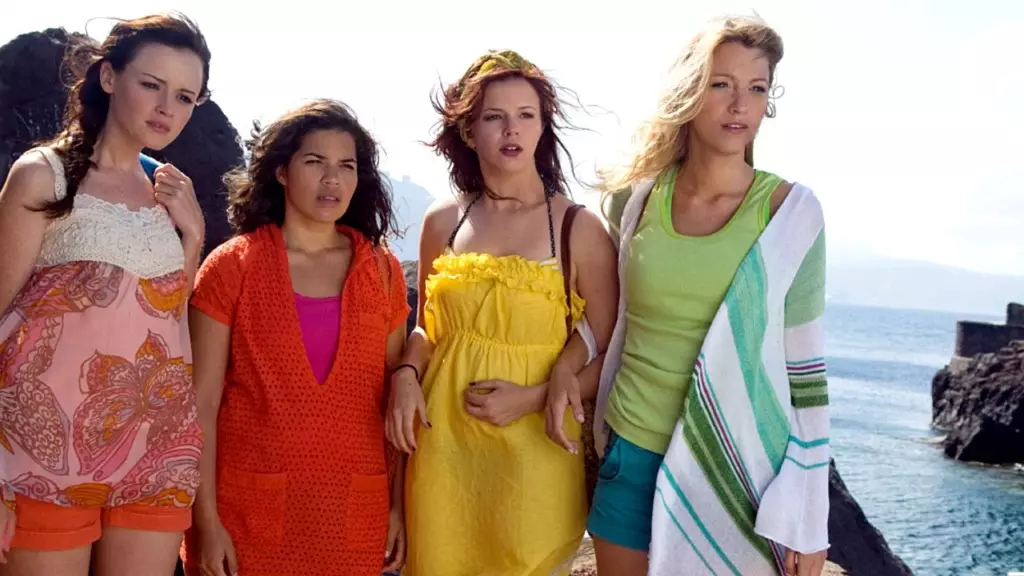In a striking demonstration of solidarity, the three co-stars of the beloved 2005 film “The Sisterhood of the Traveling Pants”—America Ferrera, Amber Rose Tamblyn, and Alexis Bledel—have publicly supported Blake Lively in light of her recent legal battle against director Justin Baldoni. This situation, shrouded in allegations of sexual harassment and character defamation, highlights not only the complexities of female relationships in the entertainment industry but also raises significant questions about workplace safety and accountability in Hollywood.
As the storyline from their film emphasized the strength of female bonds, the current events illustrate both the challenges and the triumphs of solidarity among women in an industry often fraught with predatory behavior. Their joint statement, shared on social media, underscores a critical theme: the importance of standing together against injustice. It is a call for a reckoning, illustrating that even those in positions of power cannot work with impunity.
The heart of the matter lies in Lively’s allegations against Baldoni, which encompass a range of disturbing behaviors, from inappropriate comments to a concerted effort to damage her reputation following her request for a safer working environment. Lively’s detailed 80-page lawsuit paints a troubling picture of workplace dynamics within the production of “It Ends With Us,” based on Colleen Hoover’s novel, which itself tackles themes of personal hardship and domestic violence.
In a shocking twist, Baldoni—who has vocally positioned himself as a feminist ally and recently received accolades for his advocacy—stands accused of engaging in the very behaviors that contradict the ideals he claims to espouse. This hypocrisy is not just a personal affront to Lively; it represents a broader cultural issue within Hollywood’s treatment of women and the unsettling reality that they can face severe repercussions simply for standing up for their rights.
Lively’s decision to pursue a lawsuit against Baldoni reveals not only her courage but also the systemic issues often faced by women who challenge the status quo in the workplace. The legal complaint alleges that Baldoni, together with his team, devised a strategic plan to discredit Lively, showcasing a calculated effort to retaliate against her for speaking out. This raises eerily familiar questions about the culture of silence and the lengths to which some might go to suppress dissent.
The involvement of crisis management experts signals a troubling trend in which public relations take precedence over genuine accountability. When creative professionals find themselves more preoccupied with maintaining a polished public image than with addressing allegations of misconduct, you know there is a systemic issue that requires urgent attention. The responses—or lack thereof—from industry peers further exacerbate this cycle of complicity, highlighting the need for greater support networks and frameworks to protect those who dare to speak out.
The swift and vocal support from Ferrera, Tamblyn, and Bledel is a vital reminder of the power of female solidarity. Their message calls for individuals to critically assess not just this specific incident but also the broader implications of how women are treated in various professional environments. It serves as a powerful rebuttal to the often-held belief that women should remain silent about their experiences for fear of retaliation.
Moreover, the sentiments expressed by bestselling author Hoover, emphasizing Lively’s integrity and strength, amplify the message that support from peers can foster an environment where honesty and advocacy prevail over fear and intimidation. It also highlights the necessity for allies in the fight against misconduct and systemic oppression.
A Call for Accountability
In examining these events, it is clear that accountability must be a cornerstone of any industry, particularly one like Hollywood that vastly influences cultural narratives and social norms. The fallout from Lively’s lawsuit presents an opportunity for re-evaluation of policies concerning workplace safety and equality, emphasizing that change must be enacted at both institutional and individual levels.
As we move forward, it is crucial to address these patterns of behavior, ensuring that the entertainment industry evolves into a space where women’s voices are not only heard but valued and protected. The support for Lively signals a shift towards greater awareness and the potential for real change—a necessary evolution in creating a safer, more supportive environment for all.


Leave a Reply